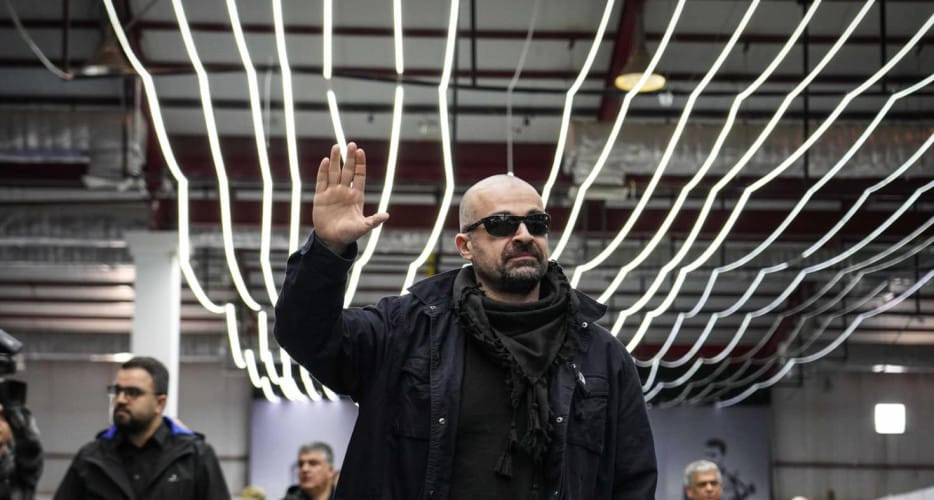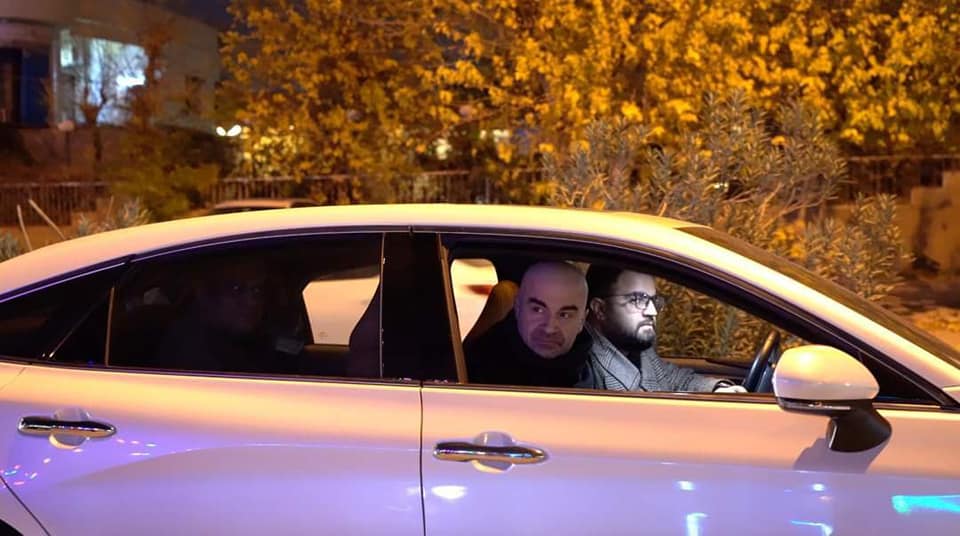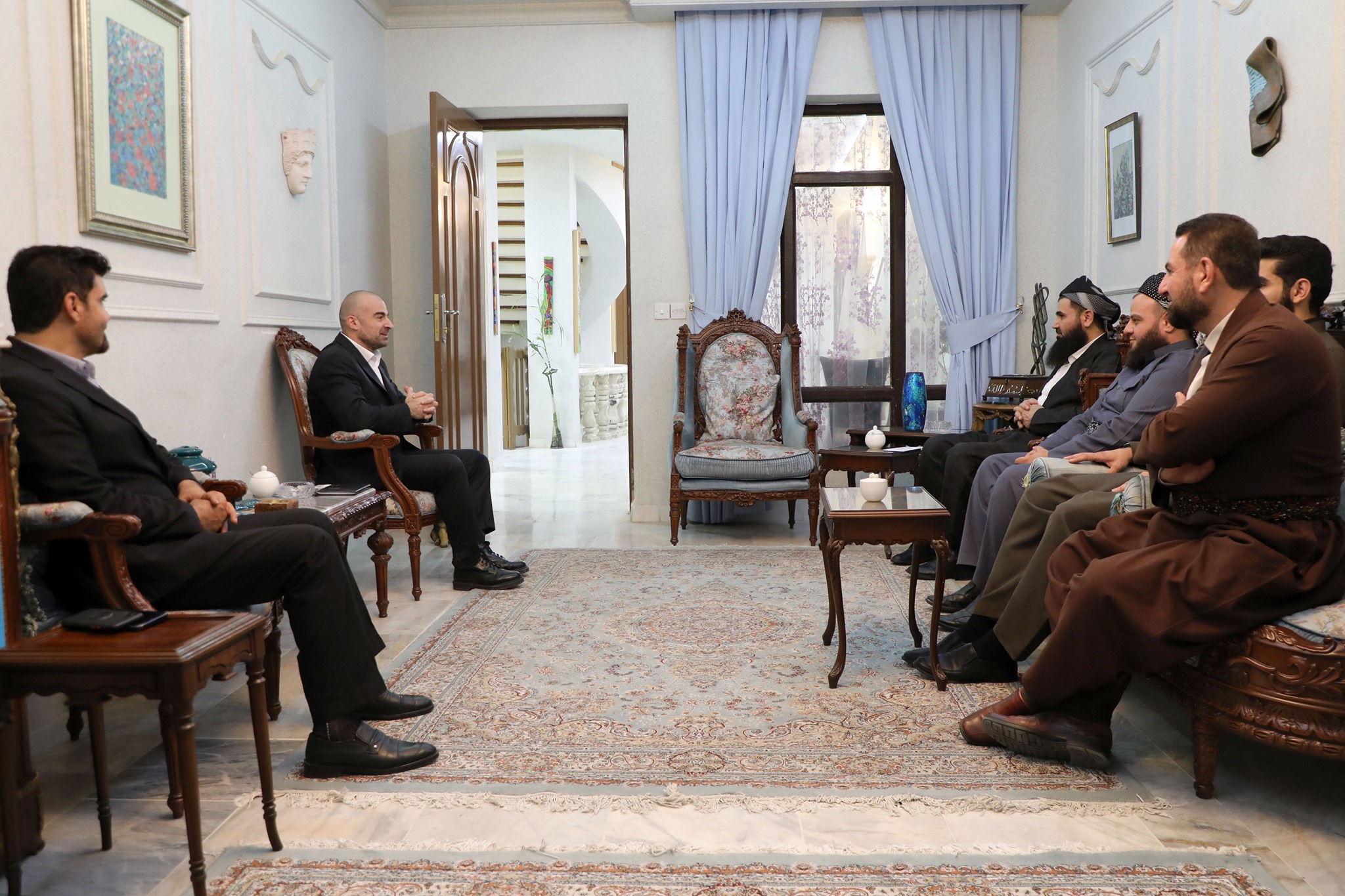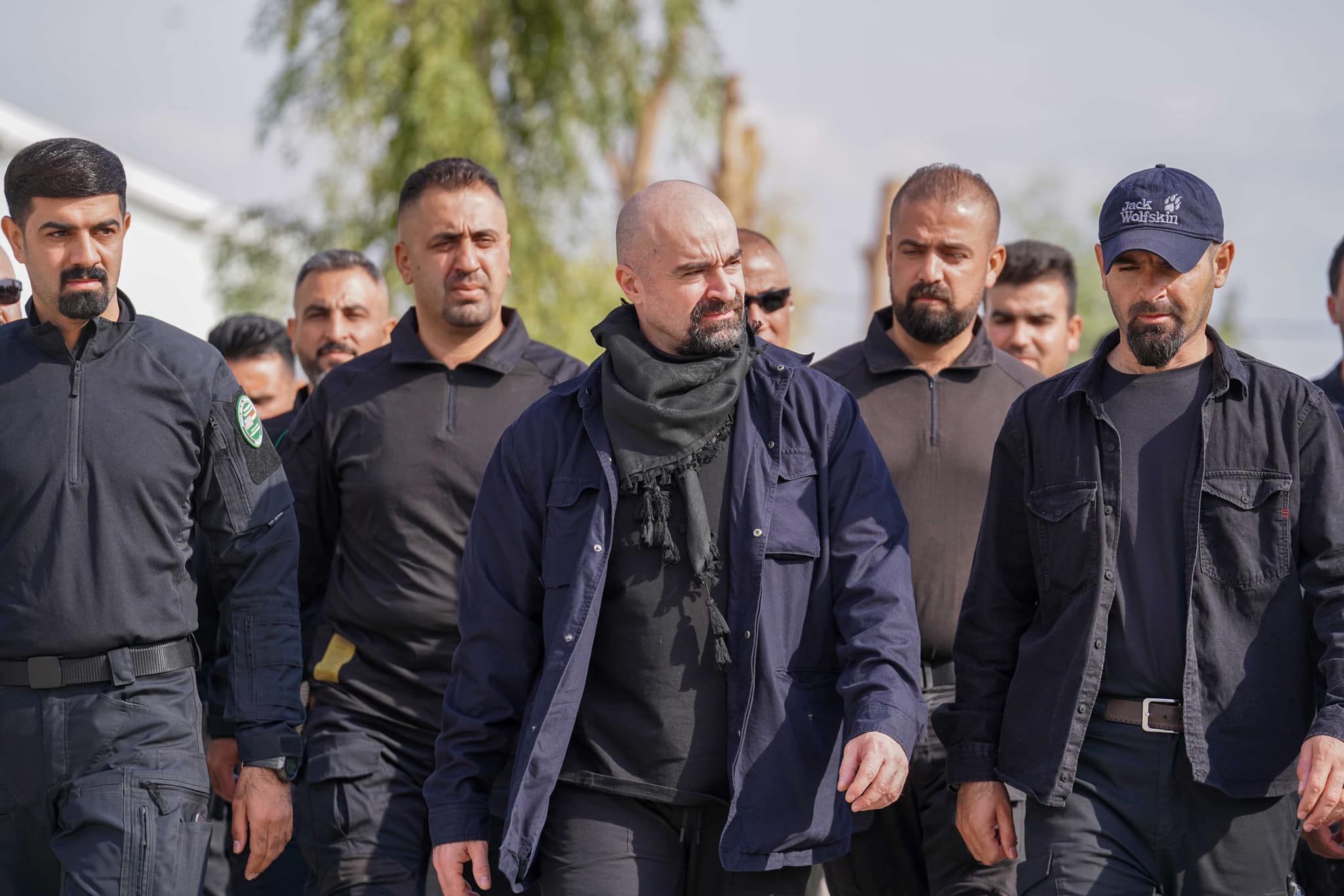
Peregraf- Surkew Mohammed
PUK used to hold the freedom in Sulaymaniyah as a victory cloak against its opponent party, the KDP. But it now seems that the equation is about to be reversed. Sulaymaniyah is now being dragged into a dark tunnel under Bafel Talabani’s ruling era.
Bafel is the eldest son of Jalal Talabani, the late Secretary of the Patriotic Union of Kurdistan. He has been in complete control of Sulaymaniyah and Halabja provinces, including both the Garmian and Raperin administrations for almost two years now. He considers himself responsible for all the good and bad in the region since the events of July 8, 2021, after he suddenly took control of the entire PUK and removed Lahur Sheikh Jangi, his party's co-chairman and cousin.
Bafel Talabani, who quickly described himself as the only leader of the PUK; promised to create a peaceful and stable environment by protecting freedom and human rights, specifically saying he would eliminate "violations of the rule of law".
The attributes of the civil society he advocates for, are not only absent in Sulaymaniyah, as observers say, but are also missing in his own appearances; He always appears in a military style surrounded by many armed men, especially counter-terrorism fighters. Prior to most of his decisions, he plays the role of the plaintiff as well as a judge, then later becomes the executive authority and enforces them through the forces around him.
Those decisions range from land distribution cases in Sulaymaniyah to sending forces to government offices, as well as direct interference in student demonstrations and closing nightclubs.
Talabani visited Sarchinar in Sulaymaniyah on the night of December 22 and decided to close all nightclubs in the area.
Sarchinar has always been a spot of tourism and entertainment for the city's people and tourists since its establishment.
The official media of the PUK said that Bafel Talabani saw in Sarchinar a "distorted environment far from the high values of the Kurdish society" and decided to close all places that are far from religion, morality, and the culture of the Kurdish society.
"The PUK is a defender of personal and private rights, but when boundaries are crossed and high values are not respected, actions must be taken," said Talabani.

Bafel Talabani staring at Sarchinar nightclubs from his press secretary's car on the night he ordered to close them. Photo: PUK Media.
According to several applicable laws in Iraq and the Kurdistan Region, there are certain procedures for investigation and closure of any place if they work against the laws, ethics of society, and governmental guidelines. None of which include a direct decision by a political leader.
Bafel Talabani's decision was directly linked to religion and quickly stirred up praise by Islamic parties and personalities, including Salafis, parliament members, and social media personalities making Talabani’s decision the main topic of the news for several days.
Many religious scholars, biased journalists, and Islamic personalities sent messages of praise. Among the well-known people who praised Talabani’s decision was Ali Hama Salih, a member of the parliament. Haji Karwan and Abdullatif Ahmed were among the religious personalities who praised the decision. Abdullatif Ahmed is a prominent Salafi figure in Sulaymaniyah, has good relations with the PUK leader and his brother is a PUK parliamentarian in Baghdad.
According to Peregraf's investigations, many of those who praised the decision were previously among the majority that had been campaigning for years to establish a civil, modern society that works by rule of law without parties' intervention.
None of these personalities criticized Talabani’s decision which was executed without orders from courts or the government and without respect for human rights and freedoms.
This is not the first personal decision of the PUK leader; he has previously arrested government employees, sent forces to the Sulaymaniyah municipality, arrested students and demonstrators, and investigated businessmen. There is a risk that the current ruling will lead to more fear and instability in Sulaymaniyah.
The Ruling Authorities and the Islamic Extremist Front
Salafis and Islamists took advantage of Bafel Talabani's decision to demonstrate that; their movement and direction is mighty and this notion is exceptionally lively and plainly evident on social media platforms. Furthermore, The Salafi and Islamic Front fight fiercely and constantly against the other fronts in Kurdish society through their writings, in other words, they clearly making accusations against those who think differently. Additionally, they insult their opponents and declaring them anti-religious figures or entities in various cases.
The recent closure of Sarchinar pubs in Sulaymaniyah coincided with the continuance of the religious campaign against writers, activists and a number of intellectual figures in Sulaymaniyah; the massive campaign is running on the pretext of defending women's rights and gender issues. Islamic "extremism" on social media sites is reflected in messages of the Islamic Front and they believe they have received strength from the sole President of PUK.
Following Talabani’s decision, Peregraf carried out an immediate follow-up to people's reactions, especially on social media platforms; according to the follow-up it is full apparent that people would like additional steps to be taken by authorities, that is to say, they almost demand an intensive campaign for eliminating introductory parties in universities and colleges, banning assemblies of alcohol drinking during the evenings of Azmr and Goyzha mountains, abolishing the open sale of wines and practicing gender segregation in schools. The latter is used by some as a joke.
According to social observers, Kurdish society has not witnessed religious problems throughout history, in other words, coexistence and social peace has been one of its prominent features, however, social issues related to religion have become a hot topic in the media and social networks in recent years. Therefore, the socio-religious issues divided people into two directions, either they are for it or against it.
Two days prior to Bafel Talabani's resolution to close down nightclubs, megaphones used for releasing a message in support of women's rights in several cities of Kurdistan region, as part of a civil activity supported by the office of Qubad Talabani, brother of Bafel Talabani and Deputy Prime Minister. The message sparked a major and fierce controversy.
The message was prevented from being published in several cities and complaints were filed against the activity. The message was published on loudspeakers on the municipal building of Halabja, causing hostile reactions and the mayor announced a sympathy strike, but later regretted it because Governor of Halabja said that "the message talks about freedom and equality, which Islam similarly supports it."
The message from the loudspeakers was a civic activity since it was the reading of a text in support of women's rights that concludes: "I am the unheard voice of women."
The Islamists launched a widespread organized campaign on the activity, as an extension of their previous campaigns on Mariwan Wriya Qane, an author, and Choman Hardi, a women's rights activist, for their writings and activities on rights, freedoms and gender issues.
Earlier, within the framework of the Islamic movement pushbacks, courses, seminars and discussions on issues related to rights and freedoms, including gender, were not allowed in Halabja University and many other places.
It is unclear what the purpose of Bafel Talabani's leaning towards Islamist. Peregraf has learned from an informed source that the relationship is such that "the PUK provides monthly financial assistance to the Kurdistan Justice Group (Komal)", which is one of the most prominent parties of the Islamist movement, especially on social networks.
Ali Bapir, the Head of Komal, does not sweep the financial assistance under the carpet. "If the PUK, or KDP or any other party helps us out free of charge, we would thank them and consider the assistance our inalienable right," Bapir said earlier in response to a question over receiving funds from the PUK.
The decisions of the PUK leader are quite pleasing to the Islamists. Qubad Talabani, The Deputy Prime Minister and brother of Bafel Talabani is currently managing a gender department in his office in the meantime, furthermore, he regards himself as an uncompromising defender of women's rights and freedoms. However Qubad Talabani has remained totally silent over the ongoing extremist campaign.
Observers of the Islamic movements firmly believe that the authorities in Kurdistan, along with the Islamic parties, deliberately gives due weight to the Madkhali-Salafis, one of the main reasons is that; Madkhali-Salafis do not believe in participating in elections, do not oppose the authorities by any means. Additionally, they do not exert any kind of pressure or protest, that is to say, they do not resort to holding demonstrations and rallies against the ruling parties or the government. Kurdish authorities is throwing significant weight behind Madkhali-Salafis and promoting full cooperation with them, as a result, Kurdish society is witnessing a dramatic growth of Salafis.

Bafel Talabani receives Abdullatif Ahmad at his residence in Dabashan, Sulaymaniyah. October 5, 2021 Photo: Bafel Talabani's Facebook page.
Sherko Kirmanj, an author and researcher, believes that Islamism, Salafism and Daeshism do not flourish in a free and friendly environment. "What has led to the growth of these three conservative and extremist fronts is the monopoly of freedom by the movements. In other words, the door and space of freedom has been closed towards liberal, egalitarian, libertarian, modern and pluralistic movements, while Salafis, conservatives and extremists receive the extraordinary red carpet treatment," Kirmanj said.
"The PUK and KDP are expelling the libertarians and embracing the conservatives. The truth of our argument is evident in the rise and exposure of both active and sleeping cells of ISIS and their activities, in addition, total restriction on freedom of expression in the universities is another manifestation of our argument," Kirmanj said. He added that Kurdish society is in need of openness "libertarians and liberals as Salafis and Islamists are equally free to express their opinions. No one should be allowed to curtail the freedoms of others in the name of God, morality and society."
During the 1980s, the Salafi movement emerged in Kurdistan region of Iraq. The most prominent figures were Hamdi Salafi in Duhok and Omar Changiani in Sulaymaniyahyah, both of whom later became KDP members. Abdullatif Salafi is currently the most prominent figure in Sulaymaniyahyah.
Although the current movement of Salafism in Kurdistan is clearly not a jihadist Salafism that believes in armed struggle against the ruling authorities, researchers assume that there may be members among them who would easily change their beliefs and take up arms if given the opportunity.
Armed Salafis flourished in Kurdistan in the 1990s and by the end of that decade, they dominated the Hawraman area under the names of Ansar-ul Islam and Jund-ul Islam, which opposed the Kurdistan Regional Government and were declared as terrorists. Bloody armed conflict broke out between the aforementioned groups and the PUK Peshmerga forces in the past.
The rise of ISIS, the attacks on several areas of the Kurdistan region and the bloody fighting with the Peshmerga forces in 2014-2017 collectively led to the revival the sleeping cells of Salafi jihadists in Kurdistan and many people joined ISIS, furthermore, many were arrested by the Kurdish security forces.
On December 21, the Kurdish security agency known as Asayish recently announced the discovery of "an emirate of ISIS terrorists" in Sulaymaniyahyah, saying "the ringleader, all the organizers and members" had been arrested, including "54 terrorists" and "three terrorists" had been killed.
The Asayish agency revealed five plans of the group, which include; "construction of a hideout and military base in Sulaymaniyahyah, creation of the emirate of ISIS in Sulaymaniyahyah Adult Correctional Prison, smuggling and escaping ISIS fighters through Kurdistan Region. The departure of several "terrorists" from the Kurdistan Region cities to Hamrin mounts and the construction of hideouts in Sangaw area.
In this month, more than 150 personalities, intellectuals and journalists sent a warning message to PUK officials, government, party and public opinion over the growth of Islamic "extremism" and social media attacks against those who think contrary to the trends of Islamic parties and personalities; however they received no response and neither the PUK nor its president paid any attention.
The Badinan Experience Repeated in Sulaymaniyah
Bafel Talabani criticizes the KDP's policies in the media, especially on the issue of rights and freedoms and the case of journalists and activists in Badinan. But Talabani’s decisions and the topics discussed in many internal meetings of his party suggest that Talabani is no different when it comes to respecting the freedom of the press and journalists.
Many political observers see the same lack of respect in Sulaymaniyah’s current state.
"Mr. Bafel said since the KDP can do it so can I," said a source.
He has said this as a sign of complete control over the region and strong centralism, like Massoud Barzani in the yellow zone.

PUK leader Bafel Talabani (center) and members of the security forces during a visit to Kurdistan Commando forces on November 8, 2022. (Photo: Facebook/bafeljalaltalabani)
The areas under Talabani’s control were previously known as the green and blue zones since some of Gorran’s power was still present. Now, after the decline of Gorran’s power and its loss of weight in the Iraqi parliamentary elections, the PUK is the only party in power in the region.
"No one inside the PUK dares to intervene in Mr. Bafel's words, but he listens to several people outside the PUK, especially some parliament members who are active on social media," said the Peregraf source.
Throughout history, PUK has always claimed its support of freedom, especially freedom of the press. During the era of Jalal Talabani, this was boldly present. His eldest son now advocates for the return of the attributes of his father’s leadership. During Talabani’s rule, the first private media and non-party television channels appeared in Sulaymaniyah. But it didn’t take long before the campaign was interrupted by a series of repression and arrests.
Since August, at least 28 journalists have been arrested in PUK-controlled areas, including a Peregraf reporter in Sulaymaniyah while covering the August 6 demonstrations of the New Generation Movement, in which hundreds of demonstrators, New Generation officials, and civil society activists were arrested. Violent clashes and arrests continued in the following days against the demonstrations of University of Sulaymaniyah students.
In early October, two journalists were arrested by the PUK's anti-terror forces while returning from Sulaymaniyah to Erbil. After a week in Asayish prison, Bafel Talabani said, "Sulaymaniyah is not a place to imprison and torture writers and journalists, it is rather a city that respects and encourages courageous writers and journalists."
Both journalists were released on the same day with Talabani's intervention and the PUK media reported it as an achievement of the party leader.
Adnan Osman, former parliament member, senior official of Gorran, and previously editor-in-chief of Hawlati newspaper described the arrest of the two journalists as "an act of showing power and scaring journalists as well as the announcement of an era of restricting and controlling freedom of criticism and writing."
"The new leadership of the PUK must know one thing clearly: they can silence dozens of senior officials of their party as well as hundreds of commanders in any way, but they can never silence the voice of the streets that have always demanded freedom and human rights." Said Adnan Osman.
The arrest and imprisonment of journalists have always been a major concern for the international community and allies of the Kurds.
In the past two years, dozens of journalists and activists have been arrested in Erbil and Badinan, most of whom have been sentenced on various charges despite international objections.
On October 17, US Consul General Irvin Hicks said in a written statement sent to Peregraf that he was concerned about the arrest and detention of journalists on charges related to their work.
The US Consul General also said that promoting democracy, human rights, and freedom of the press are their top priorities and encourage the Kurdistan Regional Government to prevent gender-based violence and hold those involved in violence against women accountable
Alongside the display of power in Sulaymaniyah, Talabani and the PUK have been making heavy accusations against the KDP over security issues over the past few months. The leader of the PUK team in the government even boycotted the government because of their problems with the KDP on the grounds of lack of transparency and injustice. The disastrous consequences of such political conflicts always fall on the people’s shoulders, causing instability in the region.
In evaluations of his steps, some say now is the time for warn Talabani. He must leave the required measures to the law in other words, the legislative, and the executive branch should be given opportunities to do their jobs since he is merely head of a political party namely PUK. The task of security forces is to maintain peace and stability. Troops should be used during warfare or deployed to suburbs of the cities and borders not to the city centers. In this way, he will be forced to look back at the city's past and at the time of his father Talabani and his mother Hero Ibrahim Ahmad who supported freedom and human rights, especially women rights, if he does not take better and more effective steps in comparison to the steps taken by his parents.